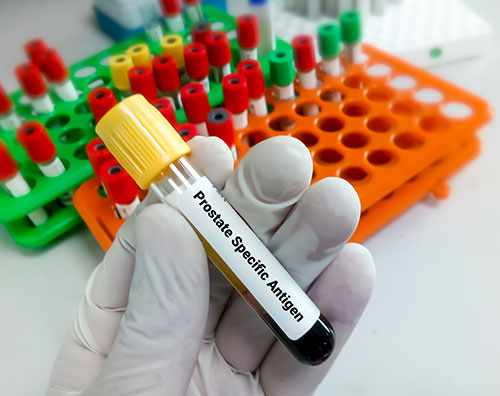Prostate Specific Antigen: The What, Why and How
Prostate Specific Antigen or PSA is a test, commonly performed as an integral part of master health checks or more commonly amongst male urological patients. Let’s find out today, why it is so.
PSA is a protein, specifically created and secreted by the prostate into the prostatic fluid. As it is formed, it undergoes a series of changes hence gives rise to different measurable and immeasurable components which aid us with diagnosis. The most commonly measured component is total PSA. The other measured components are free PSA, pro PSA and intact PSA. What we need to understand is that it is produced by both normal and cancer cells in the prostate, hence both malignant and benign conditions can have elevated PSA.

PSA alone is not enough to diagnose prostatic diseases. A detailed history and clinical examination and of course, a digital rectal examination, which provides immense information regarding a possible cause of increased PSA are needed. As mentioned earlier, several conditions can be associated with rise in PSA values, such as inflammation of the prostate (prostatitis), benign prostatic hyperplasia (age related enlargement of prostate), urinary tract infections and prostatic cancers as well. Vigorous exercise, recent biopsy of the prostate or endourological manipulations, ejaculation and certain drugs too can cause an altered PSA value.
What are normal values of PSA? PSA is usually measured in the blood, with a general range below 4.0 ng/ml. Having said that, there are certain age-related value adjustments which are accepted. A grey zone of PSA is seen between 4-10 ng/ml, for which certain scoring systems such as 4K score and PHI scoring systems are used to identify which patient needs biopsy or further evaluation. Additional investigations which help us to define the probable cause of altered PSA are ultrasound of the kidney- ureter-bladder region, magnetic resonance imaging (MRI) of the prostate, urine routine and culture tests along with uroflowmetry. Occasionally, the addition of transrectal ultrasound may be done.
So, when do we repeat the test? As a part of the screening protocol, those with previously normal values may repeat it once every year or alternate year based on if the patient has any risk factors, such as familial history of prostate cancer. Patients who have had increased PSA values, with otherwise normal findings, can repeat the test in a month’s time. A small percentage of patients are noted to have elevated PSA values without any obvious pathology, they need to be on regular follow up. Increased PSA with urinary tract infections, will require a repeat PSA after a month as well. Those patients diagnosed with prostate cancer, will obviously need to get treated for the same. It is also extremely helpful with post cancer treatment surveillance, where regular 3 monthly testing is done.
To summarize, PSA tests are done as a part of regular master health checks and screening programs. It’s always ideal to know the reason for these tests and be armed with this knowledge of the possible causes. Repeated testing is to be done as advised by your urologist.

Dr. Anu Ramesh
MS, DNB(GS), MRCS(Ed), MCh, DNB (Urology)
Consultant Urologist
Kauvery Hospital, Chennai

